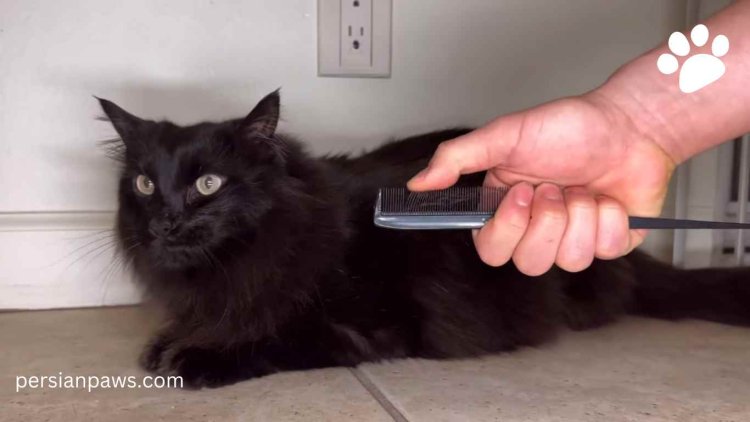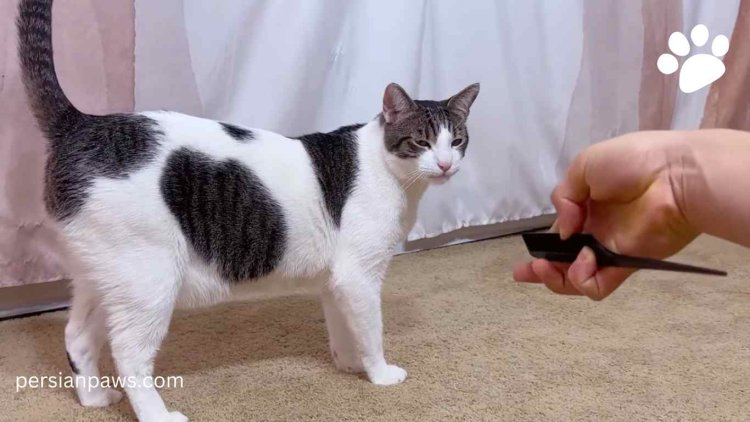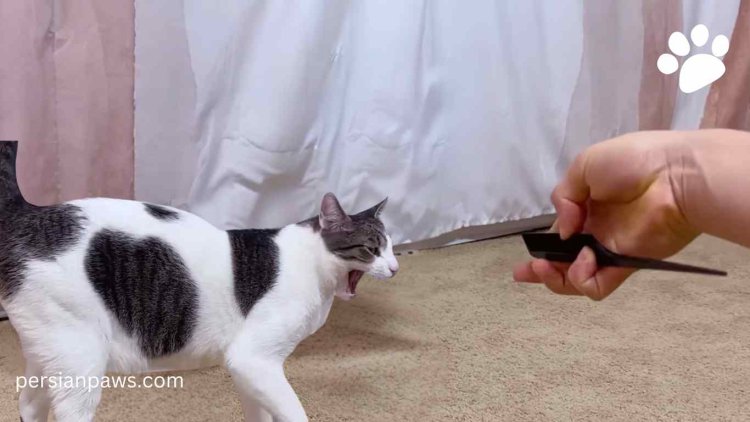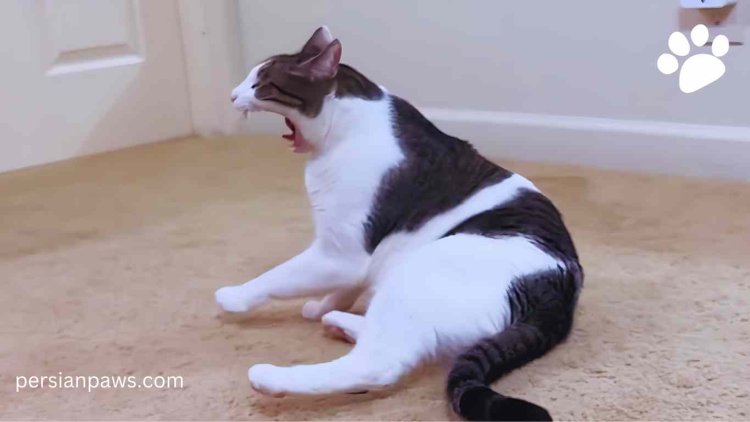Why Cats Gag at the Sound of a Comb - Revealing Mystery
Cats gag at comb sounds because they're sensitive to high frequencies, like a predator's hiss. It triggers a reflex in their ears and throat.

Table of Contents
- Why do Cats Gag?
- Cats Behavior
- Gagging Mystery
- 3.1 Why Do Cats React to the Sound of a Comb?
- 3.2 Sensitive Ears
- 3.3 Vibrations
- 3.4 Unfamiliar Sound
- 3.5 Reflex Action
- 3.6 Physiological Responses
- Practical Tips for Cat Owners
- Insights from the Expert
- Real Stories, Real Solutions
- 6.1 Case Studies and Personal Experiences
- 6.2 Case Study 1
- 6.3 Personal Experience 1
- 6.4 Personal Experience 2
- Conclusion
Have you ever noticed your cat gagging at the sound of a comb? If so, you're not alone. Many cat owners have observed this puzzling behavior, scratching their heads in confusion and concern.
Cats gag at the sound of a comb because their ears are very sensitive. The comb makes a high-pitched sound and vibrations that are too loud and strange for them. This can make them feel uncomfortable or scared, causing a reaction that causes them to gag. Always be gentle with cats to keep them comfortable.
This guide aims to unlock this mystery and provide valuable insights into why cats react this way. Stay with us as we explore the world of feline behavior and grooming, offering practical tips and expert advice to help you understand and manage your cat’s reactions.
Why do Cats Gag?
Cats gag for a few reasons. Sometimes, when they eat too fast, food can get stuck in their throat, and they gag to try to clear it out.
Cats are curious and might taste things that don't agree with them, which can also make them gag.
Strong smells can bother them and make them gag too. If a cat feels scared or nervous, it might gag as a reaction to those feelings. If your cat gags a lot, it's a good idea to ask a vet to check if everything is okay with your furry friend
Cats Behavior
Cats are careful groomers by nature, spending a significant portion of their day licking and cleaning their fur. Grooming has multiple benefits for cats:
● Hygiene: Grooming helps remove dirt, loose fur, and parasites.
● Bonding: Cats groom each other as a social activity to strengthen bonds.
● Stress Relief: The act of grooming can be calming and reduce stress levels.
Grooming can help you better appreciate why certain grooming activities, like combing, might cause unexpected reactions.
Gagging Mystery
Why Do Cats React to the Sound of a Comb?

The question of why cats gag at the sound of a comb is a topic that is interesting for both pet owners and animal behaviorists alike. Here are some potential reasons:
Sensitive Ears
Cats have very sensitive ears. They can hear sounds that we can’t. When a comb is used, it makes a high-pitched sound. This sound is too sharp and loud for a cat's ears.
Vibrations
When you run a comb through your hair, it creates vibrations. These vibrations can be felt in the air. Cats are very sensitive to these vibrations, and it can make them feel uncomfortable or even a bit scared.
Unfamiliar Sound
Cats don’t hear the sound of a comb very often. When they hear it, they might not know what it is. This strange sound can make them feel nervous. When cats are nervous, they sometimes gag as a way to show they don't like it.
Reflex Action

Gagging is a reflex(natural) action. It happens automatically when something bothers their throat or ears. The sound of the comb can trigger this reflex, making the cat gag.
Physiological Responses
Some experts believe that the gagging response could be linked to the way a cat's jaw and mouth are structured. The sound of the comb might produce vibrations that cause a natural gagging motion.
Practical Tips for Cat Owners
Managing a cat that gags at the sound of a comb can be challenging, but with patience and the right techniques, you can make grooming a more pleasant experience. Here are some practical tips:
Use a Different Tool
Sometimes, the issue might be related to the type of comb or brush you're using. Experiment with different grooming tools to find one that your cat is more comfortable with.
Silicone brushes are often quieter and less likely to cause a gagging response.
Desensitization
Desensitizing your cat to the sound of a comb can take time but can be very effective. Let your cat watch and sniff the comb first, without using it. Then, slowly play the sound for a short time. Give treats and cuddles to make your cat feel good about it.
Create a Calm Environment
Grooming should be a relaxing experience for both you and your cat. Ensure that the environment is calm and free of stress. Use a calming voice and gentle movements to keep your cat at ease.
Insights from the Expert
Jackson Galaxy, a well-known cat behaviorist, often highlights the importance of understanding a cat's unique sensitivities.
He notes, "Cats are incredibly sensitive creatures. Their reactions to certain sounds or stimuli can often be traced back to their enhanced senses and past experiences."
By accepting and respecting these sensitivities, cat owners can make grooming more balanced.
Real Stories, Real Solutions
Case Studies and Personal Experiences

Case Study 1
Coco's Journey:
Coco is an adopted cat who shows harsh anxiety and gagging behavior at the sound of a comb. Her previous owner had used a metal comb, which caused discomfort and fear.
With positive strengthening techniques, Coco's new owner gradually introduced a softer, quieter brush. Over time, Coco's anxiety reduced, and she began to tolerate grooming sessions.
Personal Experience 1
Patience Pays Off:
Jessica, a cat owner, shared her experience of desensitizing her cat, Luna. Luna initially gagged at the sound of a comb. Jessica started by holding the comb near Luna without making any sound.
Gradually, she introduced the sound while offering Luna her favorite treats. After several weeks, Luna became familiar with the sound and no longer gagged.
Personal Experience 2
Veterinary Insights:
Dr. Emily, a veterinarian, encountered several cases where cats showed gagging responses due to essential health issues.
She highlights the importance of regular veterinary check-ups to rule out any medical conditions that might be contributing to this behavior.
Conclusion
Cats gag at comb sounds because they're very sensitive. Their strong senses make them react strongly to certain sounds. Cats might be scared by loud noises and remember bad experiences. Their hearing is better than ours, so comb noises can be upsetting.
Use gentle tools and quiet places to help them feel safe during grooming. Understanding their feelings can make grooming easier and keep them calm.
What's Your Reaction?















